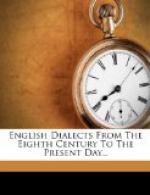VIII. THE MERCIAN DIALECT. East Midland.
Old Mercian Glossaries of the
eighth century.
The Lorica Prayer. The Vespasian Psalter.
The
Rushworth MS.
Old Mercian and Wessex compared. Laud MS. of the
Anglo-Saxon Chronicle.
The Ormulum. The English Proclamation of
Henry III. (see
the facsimile). Robert Mannyng of Brunne (Bourn).
West Midland.
The Prose Psalter. William of Palerne. The
Pearl and
Alliterative Poems.
Sir Gawayne and the Grene Knight.
IX. FOREIGN ELEMENTS IN THE DIALECTS. Words
from Norman, Italian,
Spanish, Dutch,
etc. Celtic. List of Celtic words.
Examples of
Latin words.
Greek words. Hebrew words. List of Scandinavian
words. French
words. Anglo-French words; gauntree.
Literary
French words,
as used in dialects.
X. LATER HISTORY OF THE DIALECTS. Spenser.
John Fitzherbert. Thomas
Tusser. Skinner’s
Etymologicon (Lincolnshire words). John Ray.
Dialect glossaries.
Dr Ellis on Early English Pronunciation. The
English Dialect
Society. The English Dialect Dictionary.
The
English Dialect
Grammar.
XI. THE MODERN DIALECTS. Prof. Wright’s
account of the modern English
Dialects.
XII. A FEW SPECIMENS. Some writers in dialect.
Specimens: Scottish
(Aberdeen, Ayrshire,
Edinburgh). Northern England (Westmorland).
Midland (Lincoln,
S.E. Lancashire, Sheffield, Cheshire). Eastern
(N. Essex,
Norfolk). Western (S.W. Shropshire).
Southern
(Wiltshire, Isle
of Wight, Sussex).
BIBLIOGRAPHY
INDEX
FACSIMILE. The only English Proclamation of Henry III. Oct. 18, 1258
*** For a transcription of the Facsimile see pp. 75-6.
{Transcriber’s Note:
The Facsimile is not included in this e-text.}
CHAPTER I
DIALECTS AND THEIR VALUE
According to the New English Dictionary, the oldest sense, in English, of the word dialect was simply “a manner of speaking” or “phraseology,” in accordance with its derivation from the Greek dialectos, a discourse or way of speaking; from the verb dialegesthai, to discourse or converse.
The modern meaning is somewhat more precise. In relation to a language such as English, it is used in a special sense to signify “a local variety of speech differing from the standard or literary language.” When we talk of “speakers of dialect,” we imply that they employ a provincial method of speech to which the man who has been educated to use the language of books is unaccustomed. Such a man finds that the dialect-speaker frequently uses words or modes of expression which he does not understand or which are at any rate strange to him; and he is sure to notice that such words as seem to be familiar to him are, for the most part, strangely pronounced. Such differences are especially noticeable in the use of vowels and diphthongs, and in the mode of intonation.




